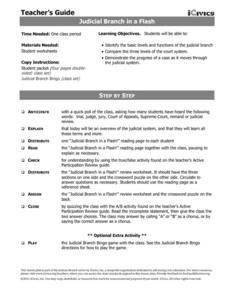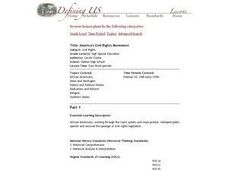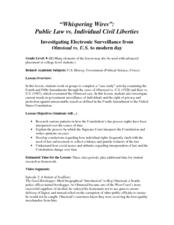Curated OER
Lesson 4: The Judiciary: A Brief Introduction to the Courts System
Focusing on the judicial branch of government, the fourth lesson in this series explores the structure of the US courts system. Beginning with an engaging activity based on the short story The Lady or the Tiger, students go on to examine...
Judicial Learning Center
Levels of the Federal Courts
The Supreme Court gets all the glory, but very few federal cases make it to the highest court. An interesting lesson explores the structure of the lower levels of the federal court system. In addition to outlining the organization of...
School Improvement in Maryland
Court Proceedings Civil Cases
What's the difference between civil and criminal law? How do the court proceedings differ in these two types of trials? How do the standards of proof differ? Why do these differences exist? As part of their examination of the US court...
iCivics
Judicial Branch in a Flash
What is the difference between the federal court and state court systems? What about criminal versus civil cases? Check out this resource that will offer your class members a general and effective overview of the judicial branch in the...
Carolina K-12
Sample Test: The Judicial System
From Marbury v. Madison and original jurisdiction to Gideon v. Wainwright and civil appeal, here is a simple and comprehensive assessment on the judicial system of the United States.
Judicial Learning Center
Types of Court Cases
How can one court acquit someone of a crime, while another convicts the person of the same one? It's all because of the differences between civil and criminal trials. An informative resource provides scholars in the field of criminology...
Judicial Learning Center
Civil Rights and Equal Protection
Almost every American is familiar with the Supreme Court case of Brown vs. Board of Education. Far fewer understand the constitutional reasoning or the wide-ranging consequences of the ruling in the field of criminology. The interesting...
Judicial Learning Center
Your Day in Court
Whether out of choice or necessity, people want to know what will happen on a typical day in court. A helpful lesson walks scholars in the field of criminology through the trial process from opening statements to the final verdict.
Curated OER
Indiana Courts: How Do They Work?
Students identify the branches of Indiana's judicial system and determine the differences between the different courts and different types of cases. Students create a flow chart showing how a court case works its way through the legal...
Curated OER
It's Your Right: A Civil Rights Brochure
Learners examine the US Constitution, Bill of Rights, and Supreme Court cases in order to broaden their understanding of the US Judicial System. They research a variety of textual and Internet resources to create a tri-fold brochure,...
Curated OER
Civil Rights Leader: Rosa Parks
All humans should have civil rights, but that wasn't the case in Alabama. This biographical presentation shares information about the life and inspiration that Rosa Parks brought to the Civil Rights movement. It explains her thoughts,...
Curated OER
America's Civil Rights Movement
Eleventh graders explore, analyze and study the background to America's Civil Rights Movement through the court system, mass protest, public opinion, political cartoons and legislation. They research Rosa Parks, Brown vs. Board of...
Judicial Learning Center
The Appeal Process
Why doesn't the Supreme Court hear testimony from witnesses? How do they complete an entire proceeding in less than two hours? A helpful lesson guides scholars of criminology through these and other questions by explaining how appeals...
Curated OER
Lesson 5: In the Courtroom: Understanding the Players and the Action
Young lawyers put Goldilocks on trial as they develop an understanding of the legal system in the final lesson of this five-part series. After learning about key terms relating to litigation, learners are assigned roles and reading...
Curated OER
Supreme Court Decisions and Their Effect On Us
Consider five Supreme Court cases and how their outcomes have directly affected the American population. Government students research and compose a 1-2 page pager outlining the examples of our daily life that have specifically been...
Curated OER
Civil Liberties and War Powers: Korematsu v. United States
Eleventh graders compare and contrast Supreme Court decisions dealing with the application of civil rights during times of war, with emphasis on discrimination and detention. Working in groups, 11th graders review cases and analyze how...
Curated OER
"Whispering Wires": Public Law vs. Individual Civil Liberties
High school student love discussing controversial issues like those brought up in this fourth amendment case study. They examine the 1928 Olmstead vs. U.S. prohibition court case, applying the fourth amendment to determine whether or not...
Teaching Tolerance
Racial Disparity in the Criminal Justice System
Explore the impact of the war on drugs in a thought-provoking lesson for high school academics. Young historians delve into the world of the criminal justice system and the racial disparity that occurs in the US. The resource provides...
Judicial Learning Center
Judicial Independence: What’s Wrong with This Court?
Why is it important for judges to operate independently of politics or other branches of government? Scholars ponder the question as they examine video clips, case studies, excerpts of the US Constitution, and an interactive computer...
Civil Rights Movement Veterans
Timeline of Events: 1960’s Civil Rights Movement of St. Augustine, Florida
A timeline can be a powerful learning tool because it reveals a pattern in events. While few would consider St. Augustine, Florida a hotbed of the 1960s Civil Rights Movement, a selection of background information and a timeline of...
Judicial Learning Center
Understanding the Types of Cases
Most young scholars are aware of the criminal courts system, but the United States Constitution allows for a much broader role. What other roles do courts play in settling other questions? A case study and WebQuest-style activities...
School Improvement in Maryland
Supreme Court Case Overview I
As part of a study of the 14th Amendment to the United States Constitution, class members examine four Supreme Court decisions—Gitlow v. New York, Mapp v. Ohio, Gideon v. Wainwright, and Griswold v. Connecticut—that incorporated the due...
Alabama Department of Archives and History
How Would You Feel? The Bravery of Civil Disobedience
As part of their study of the US Civil Rights Movement and the Montgomery bus boycott, class members read Dr. Martin Luther King's "Integrated Bus Suggestions." They then craft a short story about the first week of Montgomery bus...
Curated OER
Civil Rights Movement
Students identify and acquire an understanding of what the Civil Rights Movement consisted of, the issues that sparked the Movement, the people who participated and the events that occurred during the Movement. They also identify how to...

























